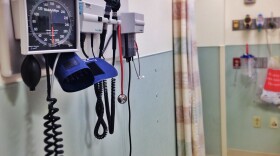It is the rare 20-year old who sits around a dorm room comparing deductibles or provider networks.
“No, we don’t talk about health insurance,” says Colby-Sawyer College nursing student Maria Antonio.
Up until now, she didn’t much have to think about it. She was covered as a teenager through Medicaid.
“And I knew a little bit, but I didn’t pay attention to it, because I’m not a type of person that is always in the hospital. But now that I’m growing up, I know that I need to know this, just in case that something happened.”
Last year as a freshman, the decision was easy: the college worked with a private company to offer a plan for $53 a month. It was basic coverage and financial protection in case something big happened.
But this year, that plan’s been scrapped because it doesn’t meet the stricter requirements under the ACA.
The new plan offered by the college is $125 per month. It covers more, including free preventive care and no annual limits, but it also comes with higher co-pays and deductibles.
“They don’t understand why it’s changed,” says Pam Spear, who oversees student health insurance for Colby-Sawyer. “They don’t understand why it’s gone up. They don’t understand co-pays or co-insurance or any of that. Nor, unless they are sick, do they really want to hear about it, either.”
After getting quoted the new price, the school decided to relax its policy of mandating all students carry coverage, though the ACA requires basically everyone to be insured anyway.
Last year, 300 undergrads bought in. This year it’s closer to 60.
Spear says the health law will bring down prices for a lot of people, and guarantees coverage for the sick.
“But for this particular group of people, I don’t see this as advantageous.”
Prices Up Across The State
Students at other schools face a similar pinch. St. Anselm’s plan jumped nearly 50%, New England College is up a quarter, while UNH and Dartmouth report only modest price increases.
The national average for public school plans this year is around $2,000, while private school premiums average $2,300.

Only a minority of students actually buy these plans, however, even at schools that mandate coverage. That’s because since 2009, New Hampshire has allowed anyone under age 26 to stay on a parent’s plan. So-called Obamacare extended that provision to all states a year later, and the feds report more than 3 million young Americans have taken up the offer.
And most schools provide some medical care regardless of insurance.
“I think for what the majority of college students need, they get here,” says Christine Burke, Director of the Center for Health and Wellness at Keene State College, an on-campus clinic where student can see a nurse practitioner or pick up a prescription.
It’s paid in part by a mandatory $180 student fee.
“The challenge comes if and when they need some type of specialist,” says Burke.
The specialist issue can get complicated, especially for students who are coming from out-of-state. For them, buying a New Hampshire policy to ensure you’re covered locally may make sense.
No Shortage Of Choices
There’s another option for students looking for coverage, according to Jennifer Patterson with the N.H. Insurance Department.
“That is the age demographic that can purchase the catastrophic plans. If they are under 30 and that’s the way they want to go, and there isn’t one through their university, maybe that would be a great option for them, because it should be cheaper, and it really is catastrophic. It is in case something really bad happens.”
Anthem’s Catastrophic Plan for a 20-year old is $96 a month, but it comes with a deductible north of $6,000, something a college student may not have stashed away.
And, as if this health insurance multiple choice test isn’t confusing enough, here’s another bubble: Medicaid could be an option for some students, depending on what state lawmakers decide to do about expanding the program.








